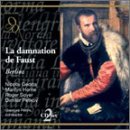| All Artists: Hector Berlioz, Georges Prêtre, Orchestra of Rome, Nicolai Gedda, Marilyn Horne, Dimiter Petkov, Roger Soyer Title: Berlioz: La Damnation de Faust Members Wishing: 0 Total Copies: 0 Label: Opera D'oro Original Release Date: 1/1/1969 Re-Release Date: 7/3/2001 Genre: Classical Style: Opera & Classical Vocal Number of Discs: 2 SwapaCD Credits: 2 UPC: 723724020825 |
Search - Hector Berlioz, Georges Prêtre, Orchestra of Rome :: Berlioz: La Damnation de Faust
 | Hector Berlioz, Georges Prêtre, Orchestra of Rome Berlioz: La Damnation de Faust Genre: Classical
|
Larger Image |
CD Details |
CD ReviewsA Masterwork of French genius Sungu Okan | Istanbul, Istanbul Turkey | 01/22/2006 (5 out of 5 stars) "I think, during of all Berlioz composer life, there are two climaxes: First of these is, of course, Symphonie Fantastique which written in a tragic period of Berlioz because of his love to Harriet Smithson, and he used a story about a nightmare! Surely, it is amazing, but the Second masterwork is that opera, La Damnation de Faust. Actually, it is called as a "dramatic legend", because, Berlioz did not think that work as a opera to be staged, but think as a concert opera and audiences will imagine the atmosphere, in other words, an theater of the mind. But nevertheless, this work is staging today, too, and there are DVDs' of some live performances, too. This is one of the most fantastic operas ever written. And, I think, this is the most succesful stage work by Berlioz. As you know, Berlioz written an early study work based on Gothe's Faust, named "Eight Scenes from Faust"...and some of these scenes are, "Easter Scene", "The King of Thule", Romance of Margharete"... And this opera (or dramatic legend) scored for very large ensemble (as usual in Berlioz): very huge chorus (or 2 choirs), children's choir, in orchestra: tripled woodwinds (with 4 bassoons), 6 horns, 6 trumpets, 3 trombones, 2 tubas, 2 set timpani, bass drum, cymbals, snare drum, gong, bells, 10 (!) harps, about 60 - 70 strings... But, soloists are only three: Faust (tenor), Margharete (soprano), and Mephistopheles (bass - baritone)... I like especially this movements: 1st Act: Solar Eclipse Scene, Hungarian March (still, this is the most famous movement, as you know). 2nd Act: Easter Scene, The Chorus of Soldiers (last movement). 3rd Act: The King of Thule, Duo of Faust and Margharete. 4th Act: Romance, Pandaemonium (of course, the chorus of damned and devils, really terrific)... About this recording, this is a very succesful performance, came from a live 1969 occasion in the Opera of Rome. Goerges Pretre, (who one of the greatest conductors of opera and French music, and a very close friend and the favourite conductor of Maria Callas), and the Orchestra of Rome Opera played sensitive and powerful too. The cast is a star group: Faust sung by Nicolai Gedda, who sung that role may be hundreds, Marguerita sung by Marilyn Horne, Mephisto sung by Roger Soyer, who has a devilish sound. Sound quality, becuase of the live performance, not excellent, but listenable, neverthless, the performance and that masterwork of Berlioz is a worth-to-listening. In other words: at this price, this is a must have for all Berlioz and opera admirers. Highly recommended." A vigorous live Faust, but not a patch on Pretre's studio ve Santa Fe Listener | Santa Fe, NM USA | 02/06/2007 (3 out of 5 stars) "In 1969, the same year that Pretre made an excellent Damnation de Faust for EMI in Paris, he traveled to conduct the work in concert with forces from the Rome Opera. The result is in reasonable FM braodxast stereo (more than a little constricted, however, and with the chorus too far back), and it's exciting from beginning to end. The only soloist carried over from the studio set is tenor Nicolai Gedda as Faust, but he's almost worth the whole price--here he sings with wonderful passion and commitment, and his voice is in ringing shape.
After that the fall-off is fairly drastic. The Italian musicians and chorus aren't to the manner born. NOt only doesn't this performance sound French, it sounds pedestrain in execution. Pretre, as was his wont, whips things up, but rhythms tend to be foursquare. Marilyn Horne's voice strikes me as temperamentally wrong for Marguerite (it's like asking a Valdyrie to be a flower maiden), but she sings beautifully, in best voice. Roger Soyer makes for an scary, if blustery Mephistopholes. The final ride to Faust's damnation chills the spine. In all, this is one of Opera d'Oro's better installments, despite its evident drawbacks. However, unless you're a diehard Gedda fan, there's no reason to prefer it to the EMI recording." |

 Track Listings (12) - Disc #1
Track Listings (12) - Disc #1